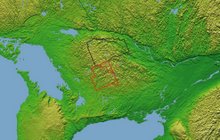By Tara Lohan
Americans have been long chastised for our environmental footprints (and for good reason). But the latest report from environmental groups including Greenpeace should give us major reason to pause. The Guardian could not have said it any better:
The tenderness of the delicate American buttock is causing more environmental devastation than the country's love of gas-guzzling cars, fast food or McMansions, according to green campaigners. At fault, they say, is the US public's insistence on extra-soft, quilted and multi-ply products when they use the bathroom.
The numbers are shocking: More than 98 percent of the toilet paper we use in the US is from virgin forests, the Guardian reports. Across the world, people are struggling to save our forests from deforestation, and instead of helping out, we're wiping are butts with our best defense against climate change. And until the time comes when Obama gets Congress to pass a TP Act, Greenpeace has some help for consumers, with a handy guide for getting some good toilet paper that won't harm the environment.
The New York Times explained why it is we insist on only the finest trees:
...Fluffiness comes at a price: millions of trees harvested in North America and in Latin American countries, including some percentage of trees from rare old-growth forests in Canada. Although toilet tissue can be made at similar cost from recycled material, it is the fiber taken from standing trees that help give it that plush feel, and most large manufacturers rely on them.
The Guardian explains why this phenomena is not worldwide, but seems to be an American experience:
Dave Dixon, a [Kimberly-Clark] company spokesman, said toilet paper and tissue from recycled fibre had been on the market for years. If Americans wanted to buy them, they could.
"For bath tissue Americans in particular like the softness and strength that virgin fibres provides," Dixon said. "It's the quality and softness the consumers in America have come to expect."
Longer fibres in virgin wood are easier to lay out and fluff up for a softer tissue. Dixon said the company used products from sustainbly farmed forests in Canada.
Americans already consume vastly more paper than any other country -- about three times more per person than the average European, and 100 times more than the average person in China.
Greenpeace launched a campaign to draw attention to why this might be a significant problem. The Times writes,
Still, trees and tree quality remain a contentious issue. Although brands differ, 25 percent to 50 percent of the pulp used to make toilet paper in this country comes from tree farms in South America and the United States. The rest, environmental groups say, comes mostly from old, second-growth forests that serve as important absorbers of carbon dioxide, the main heat-trapping gas linked to global warming. In addition, some of the pulp comes from the last virgin North American forests, which are an irreplaceable habitat for a variety of endangered species, environmental groups say.
Greenpeace, the international conservation organization, contends that Kimberly Clark, the maker of two popular brands, Cottonelle and Scott, has gotten as much as 22 percent of its pulp from producers who cut trees in Canadian boreal forests where some trees are 200 years old.
There are solutions. As Graham Hill says in the Huffington Post, “Shouldn't we take a hint from Islamic culture and ask ourselves, ‘If there's **it anywhere on our body would we prefer to wipe it away with paper or wash it off with water?'”
And if that route won't work. Hill has another idea -- government action.
Instead of waiting decades for carbon-soaking forests to stop being decimated by our need for t.p., this is an area where the government should step in. Someone needs to step up and tell us that next year or in two years or three, all toilet tissue will be 20 percent recycled fibers (for example).
Yes, Kimberly-Clark will scream and cry, and yes, it seems like a somewhat trivial matter. Yet enforced cultural change is hard. We keep buying the soft stuff that strips the forests because it's there on the shelf. So this might not be the place where we can afford to wait for every last human consumer to decide that recycled t.p. is okay. We need the forests and their CO2 absorption now.
So instead of letting demand drive forest decimation, let's get Euro and demand manufacturers put increasing amounts of recycled fiber into their squares. If we did I'll just bet they'll find another technique to eventually give us soft and recycled. In the meantime we all suffer the relative indignity of the new rough and tough toilet paper era together.
It's all a matter of perspective really. Sure, soft toilet paper may be a sweet luxury you don't want to part with, but I'll take an old-growth forest any day and the possibility that rising seas might not actually wipe out my coastal abode.

No comments:
Post a Comment